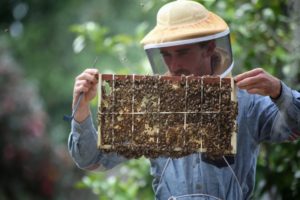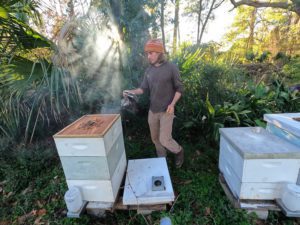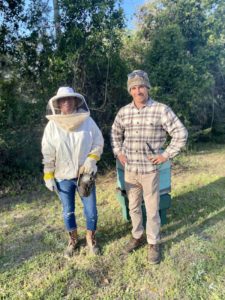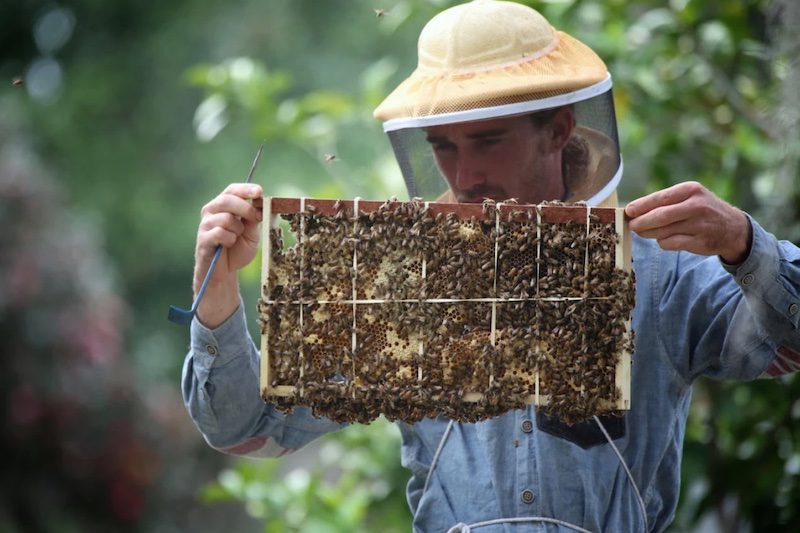Beaufort is buzzing about a new rent-a-beehive program.

Camp Arnold checks a beehive
A new rent-a-beehive program in Beaufort offers homeowners and renters a way to host a honeybee hive and enjoy honey made from their own backyard, without the responsibilities of beekeeping. If you could pollinate 300 million flowers a day, would you? That’s what a single honeybee colony is estimated to do.
Local beekeeper and owner of Beaufort Bees, Camp Arnold, designed the Bee the Change Program for anyone in Beaufort who might be curious about keeping honeybees—whether it’s for their pollination services; the allergy-fighting properties and deliciousness of raw, local honey; or, simply to admire and learn about honeybees from a distance. After all, honeybees are one of human civilization’s most influential species, shaping modern agriculture as we know it.
“I have a lot of inquiries from people who want to get started with beekeeping,” Camp says. “Bee the Change gets them started with a beehive delivered to their door with one-on-one instruction. The program answers a lot of their questions, and it’s a way to get into beekeeping without the long-term commitment.”
Camp got into beekeeping accidentally. His appreciation for native plants and

Camp at work with his hives.
interest in permaculture formed his ethos for working in sync with nature to garden. One day he received a call about an unwanted swarm of bees in town. He couldn’t resist trying to rehome them near his garden. With only a painter’s suit, a hairnet for a face mask, and duct-taped gloves, he managed to bring them home, but the colony didn’t survive the night. This disheartening experience motivated him to learn what he didn’t know about caring for bees at the time. Four years later, Camp now works full-time running Beaufort Bees, a humane honeybee removal and relocation business. When he’s not rehoming honeybee colonies between Savannah and Charleston, Camp takes care of bees for Beaufort County homeowners and consults new beekeepers in the area. This is the first year of the Bee the Change program, exclusive to Beaufort County residents.
The program is straightforward and as hands-off as anyone would like it to be. Camp visits your property to identify the best location to place the colony, or colonies if you want more than one hive. Then he brings an active beehive on a stand to the chosen site. He’ll revisit soon after to make sure the honeybees are adjusting well. Once your beehive is established, Camp visits once a month to check on the health of the colony. Bee suits are provided for participants who want to join him in going through the hive, or you can skip this part altogether. At the end of the season, Camp harvests the hive’s honey for you as part of the program, just in time for the holiday season.
Naturally, bees are wild, and there’s no telling what a colony will do or produce in a season. That’s why the program guarantees that participants will receive raw, local honey from Beaufort Bees in the event their hive can’t be harvested that year. It’s a win-win-win for everybody, including the bees.
Kate Gill of Port Royal was the first person to join the program at the end of March and is excited to try beekeeping. “I enjoy organic, sustainable, pollination-friendly gardening, and a lot of people in the near radius enjoy it, too,” says Kate.
After building an in-ground worm composter and filtering sludge from her small fishpond to apply to plants, Kate was looking for her next fun adventure with gardening. She considered chickens but decided on bees instead.

Kate Gill and Camp
“The gardening neighbors have welcomed our new addition,” Kate says. “We gather around this gentle hive and will watch and learn from Camp throughout the summer. I haven’t been stung once.”
In fact, a common misconception about honeybees is their danger. Beekeepers can be surrounded by hundreds of bees without getting stung. Why? Honeybees are typically so engulfed in the pursuit of food and their work they can’t be bothered by their gigantic onlookers.
“One of the goals of the program is to destigmatize the fear of bees,” Camp says. “They’re dangerous to select individuals but for the most part they’re not dangerous. They’re not going to come after you if they’re not provoked.”
Weather conditions and other factors come into play the more an individual works with bees, so occasional stings are possible. That’s what the bee suits are for. However, if you’re a part of the small percentage of people lethally allergic to bee stings, this program isn’t for you.
Not everyone is as enthused or adventurous as Bee the Change’s pioneer Kate, and perhaps that’s the beauty of the program. Participants don’t have to do anything at all—they can simply admire their bees attending the flowers from afar and let Camp of Beaufort Bees do the rest.
To learn more or consider “beeing” the change, visit www.beaufortbees.com/bee-the-change, or get in touch with Camp Arnold, owner of Beaufort Bees at 904-803-4079.







